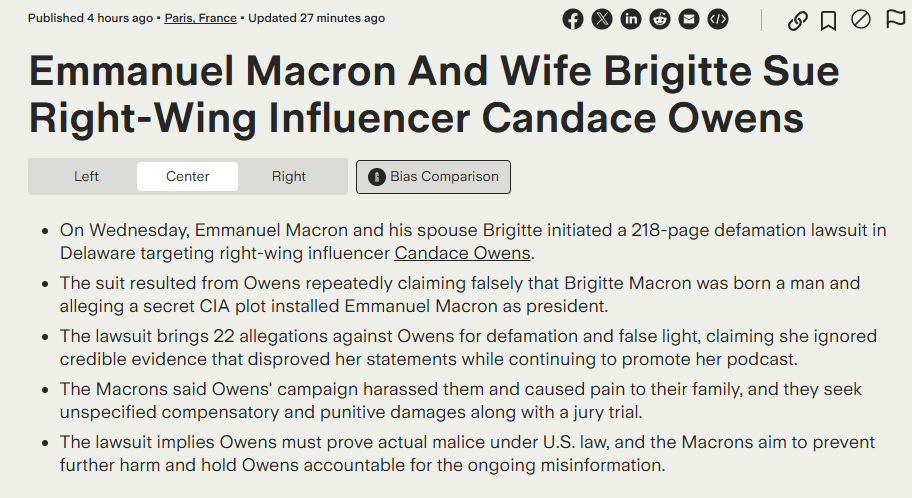
Candace Owens, the controversial political commentator known for stirring debates around antisemitism, race relations, and even high-profile cases like Mel Tucker, has recently found herself at the center of a transatlantic legal storm. French President Emmanuel Macron and First Lady Brigitte Macron have filed a lawsuit against Owens for defamation, directly addressing her widely circulated claim that France’s First Lady was “born male.” The allegations were aired through Owens’ popular podcast, triggering international attention and considerable backlash.
The Claim: Truth or Misinformation?
At the heart of the controversy lies Owens’ provocative assertion: Brigitte Macron, young in appearance despite her age, allegedly has a hidden past, including being “born male.” While these claims appear tailored to incite controversy and maximize social media reach, a quick fact-check underscores their baseless nature. Historical records and credible biographical information clearly document Brigitte Macron’s life as a woman from birth. Owens’ assertion lacks any credible evidence or corroboration from authoritative sources.
Why Macron is Suing: The Legal Perspective
President Macron and his wife’s decision to pursue legal action against Owens underscores the seriousness with which they regard these claims. French law regarding defamation is notably strict, emphasizing the protection of individual dignity and reputation. The lawsuit explicitly targets Owens’ deliberate dissemination of misinformation, potentially damaging not only personal reputations but also the credibility of France’s public office. The Macron lawsuit aims to challenge Owens’ accountability for spreading harmful falsehoods rather than merely serving as a political statement.
Consequences Beyond Defamation
The lawsuit against Owens isn’t just a legal spat—it’s a broader critique of modern digital culture’s tolerance for misinformation. Owens, who has also faced scrutiny over her past remarks associated with antisemitism, often leverages controversy to boost visibility. Her inflammatory rhetoric isn’t isolated: a separate controversy recently erupted when Owens accused Zohran Mamdani, a New York Assembly member, of being an “Israeli plant,” escalating her already contentious relationship with Jewish communities.
Impact on Public Discourse

The Owens-Macron defamation lawsuit highlights the troubling ease with which misinformation spreads online. Platforms, often prioritizing sensationalism, amplify claims that can damage reputations irreparably. For Owens, the lawsuit might reinforce her controversial public persona; for Macron, it reinforces France’s proactive stance against defamatory content.
The Importance of Fact-Based Journalism
Reliable, fact-based journalism remains essential in such contexts. Viral misinformation threatens public trust, demanding rigorous standards in reporting. The case vividly illustrates the consequences of unchecked viral narratives and serves as a reminder of why diligent fact-checking remains critical in today’s information landscape.
Implications for Candace Owens’ Career
The legal action against Owens could significantly impact her public and professional standing. Legal analysts suggest that a verdict against her might set a precedent for how far public figures can push controversial narratives before facing substantial repercussions. Meanwhile, Owens’ supporters argue the lawsuit is an attack on free speech, igniting debates about the limits of public commentary versus defamation.
Looking Ahead: Setting a Precedent?
As this legal battle unfolds, the implications stretch far beyond Owens or Macron. It potentially marks a turning point in digital discourse, prompting renewed calls for accountability among influencers and media personalities. Observers around the globe will watch closely, awaiting a verdict that could define the boundaries between provocative commentary and defamatory misinformation in the years ahead.






